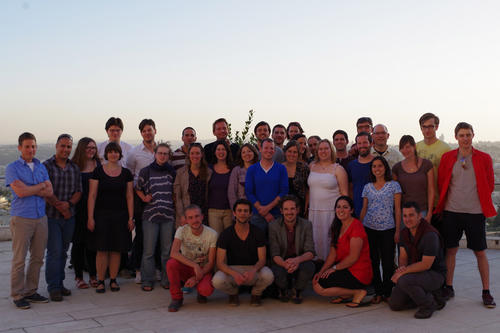Award for Outstanding Instruction
Inaugural Teaching Award of Freie Universität to Be Granted at “Teaching Day” on May 6
May 05, 2014
Thirty students from Israel and Germany are researching the Holocaust together. This group photo was taken while the Berlin-based group was visiting the Hebrew University of Jerusalem.
Image Credit: Marc Ullrich
Students in history and teaching credential programs from Israel and Germany are working together to develop instructional concepts on the topic of the Holocaust and using this as a basis for developing new materials. This unusual project initiated by history educator Martin Lücke is set to receive the inaugural Teaching Award of Freie Universität Berlin on Tuesday. The award will be granted during an event called “Teaching Day,” which aims to foster dialogue and exchange among multiple initiatives to promote excellence in teaching at Freie Universität. For example, certificates from the “SUPPORT for Teaching” project will also be awarded during the event.
Fences, uniformed guards, the national flag – things that are unimaginable at German Holocaust remembrance sites are often part of everyday life in Israel. When Martin Lücke of Freie Universität Berlin discussed the two countries’ different ways of dealing with the culture of remembrance with colleagues from the Hebrew University of Jerusalem, the idea of a joint program was born. Over the last few months, the program has taken shape at the two universities, in the form of tutorials, seminars, and exchange encounters. Israeli and German students delve into the historical and cultural background behind the Holocaust, the way the event is publicly remembered in the two countries, and how the subject is taught in schools. “The goal is to develop freely accessible teaching materials on aspects of the Holocaust that are equally relevant to both countries and then make these materials available online,” Lücke says.
The German-Israeli project not only offers an opportunity for scholars of specific disciplines to investigate the important topic of the Holocaust, but also opens up avenues of intercultural exchange, said the president of Freie Universität, Professor Peter-André Alt, when explaining the judging panel’s decision. The entries had included 20 projects from all the disciplines represented at the university. The award comes with a prize of 10,000 euros, which will benefit the development of the online platform www.historycultures.de, where the new teaching material will be made freely accessible.
Functional Cooperation despite the Distance between Countries
Without the Internet, the students involved in the project say that participants’ joint work would have been inconceivable: “Using videoconferences, Skype, and social networks like Facebook, about 30 students in all – one half from Israel and the other from Germany – have been engaging in dialogue and working together in mixed groups since the winter semester,” explains Adrian Lehne, a tutor in the History Education division.
Transcending physical distance, the students have also engaged in a comparison of history textbooks in the two countries. While these kinds of texts in Germany draw mainly on the perpetrators as sources, Israeli textbooks concentrate primarily on the Jewish resistance and life in the ghettoes, explains doctoral candidate Marc Ullrich, who led the tutorial together with Lehne. “In Israel, you might see an entire book dedicated to the topic, or 80 to 90 pages, while in Germany it’s usually less than ten,” Lücke explains. He thinks educators need to supplement the role of the Jewish victims with additional perspectives, pointing to the importance of Jewish scholars and artists, Jewish life before Nazi persecution, and the postwar period as particular gaps in existing teaching materials.
Architectural Comparison of Remembrance Sites Included in Program
In April, the students from Berlin visited Jerusalem, where their stops included Yad Vashem – one of the most important Holocaust remembrance sites and archives in Israel. When the Israeli group visits Germany in turn, this August, they will go to the House of the Wannsee Conference and the Memorial to the Murdered Jews of Europe, likewise key remembrance sites. Lücke hopes that the image of friendly, solid German-Israeli relations is something participants will take with them in their later lives as teachers, adding to everyday schooling in both countries.
With the Friedrich-Ebert-Stiftung and its “Gegen Rechtsextremismus” (Against Right-Wing Extremism) program, the Jewish Claims Conference, Stiftung Deutsche Klassenlotterie as well as the DAAD Center for German Studies and the Richard Koebner Minerva Center for German History at the Hebrew University of Jerusalem, Lücke and his team, together with their colleagues in Israel, have already secured the financial support needed for the first year of the program. Now their aim is to offer the exchange program and the seminars to accompany it annually at both universities in the future.
A longer version of the text originally appeared in German on May 5, 2014, in the Tagesspiegel supplement published by Freie Universität Berlin.

